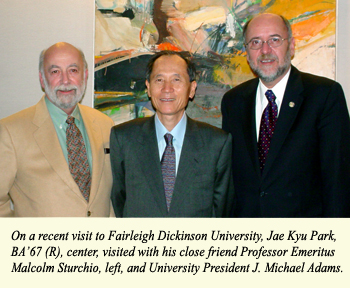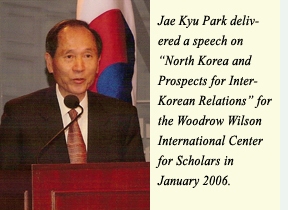


| “I have as much love for FDU as I do for Kyungnam University.” — Jae Kyu Park |
|---|
Family Ties at FDU
While building Kyungnam, Park has kept close with his alma mater. “I have as much love for FDU as I do for Kyungnam University,” he says.
In addition to helping develop collaborative programs, Park formed FDU’s first international alumni chapter and served on the Alumni Association Board of Governors. He also has generously supported FDU, in particular contributing to the renovation of the Rutherford Room at the Metropolitan Campus, which features photos and memorabilia from FDU’s original campus. Park loves the Rutherford Campus so much that whenever he visits the area he walks the grounds, which are now home to Felician College.

“I was blessed with meeting so many truly wonderful people while studying there. Many of the friendships I developed back then have lasted to this day. The place is like a second home to me, and many of the people I’ve gotten to know through FDU have become like family.” And one he met at FDU did become family. It was at the Rutherford Campus that Park met his wife, Sun Hyang Kim. The couple has two children and their son, Jeong Jin, completed his graduate studies in public administration at FDU’s Metropolitan Campus in May. “I know his experience was rewarding,” says Park, adding, “who knows, maybe my grandson will be roaming the halls at Teaneck some time down the road.”
“… who knows, maybe my grandson will be roaming the halls at Teaneck some time down the road.” When he was roaming the FDU halls in the 1960s, Park met Malcolm Sturchio, now professor emeritus of chemistry. The two became close friends, and when Park was married at a small ceremony at a chapel in the United Nations, Sturchio was the only American at the affair. “He’s an amazing guy,” says Sturchio. “He’s very mild mannered, but he’s incredibly determined. And when he says something, you can take it to the bank.”
Sturchio adds that Park is “a visionary leader who took this small school and built it into a major institution with programs throughout the world.”
Park’s extraordinary achievements in education and international relations have several times been acknowledged by his alma mater. In 1987, he was awarded an honorary LLD from the University. He also was honored in 1989 as an inaugural member of The PINNACLE, given annually to outstanding alumni, and he received the University’s Charter Day Award in 2001.
Among his many other efforts, Park has served as chairman of the Korean President Association of Private Universities and president of the Korean University Presidents Association. A prolific author of many books and articles, his major publications include Cold War and U.S. Foreign Policy Toward Asia and New Diplomacy of North Korea and Its Survival Strategy.
Sturchio has seen first-hand the level of recognition Park enjoys in Korea today. “You cannot walk down a street in Korea without someone knowing who he is,” he says, adding that Park is a regular fixture in Korean national media. His place in Korean society was noticeably enhanced by his role in the historic summit of 2000.
| “Words cannot express the joy and hope I felt at that moment when the two leaders of the divided Koreas shared a toast at the end of the summit.” — Jae Kyu Park |
|---|
‘Best Suporting Actor’
On Christmas Eve, 1999, Park received a call from South Korean President Kim Dae Jung, who asked him to take on the job of minister of unification. Park’s knowledge and expertise in North Korean studies made him a logical choice. The administration’s “sunshine policy” sought to cooperate and reconcile with the North. This process culminated in the June 2000 summit in North Korea’s capital, Pyongyang, which some regard as the finest achievement in world peace in the latter half of the 20th century.
Labeled “Best Supporting Actor” by the Korea Times, Park chaired the summit’s organizing committee and then continued to play a major role in both the post-summit and ministerial-level talks as the head of the South Korean delegation through the spring of 2001.

“I was fortunate to have had the president’s support and trust in my opinion and analysis of North Korea,” Park says. “If you know and understand anything about the history of modern Korea, then you’ll know how unbelievably exhilarating it was to have traveled to Pyongyang and to have been able to witness the summit in which the two leaders met face to face, shook hands and conducted serious talks.”
This was the first time the top leaders of the two Koreas had ever met. The summit, which produced the June 15 North-South Joint Declaration, was a “truly momentous event,” says Park, “because it helped transform South-North relations from hostility and confrontation to reconciliation and cooperation.”
Among other things, the joint declaration indicated that the North and South would work together toward reunification, promote the balanced development of the national economy and encourage cooperation and exchanges in all fields.
“The summit ushered in a new era of amity, and I am honored to have had the opportunity to play a part,” Park says. “After a half century of enmity, the two Koreas are now moving forward with a cooperative spirit to reconcile their differences and build a future of peace and prosperity together. Words cannot express the joy and hope I felt at that moment when the two leaders of the divided Koreas shared a toast at the end of the summit.”
Park also is famous for his personal meeting following the summit with North Korean leader Kim Jong-il, when he visited him at Kim’s ranch in a reclusive northern area. “I found him to be quite sharp and on top of what’s going on around him,” Park recalls. “He was willing to listen to his guest, even try to understand me. He tried to be friendly. His authority, however, seemed unchallengeable.”
He adds, “Personally, I believe he is a man who is very aware of the challenges he faces and the constraints placed upon him. He has his own agenda, policy goals and roadmap, and I hope he will be successful in the normalization of relations with the United States and Japan through the peaceful resolution of the nuclear issue.”
Park says that North Korea’s nuclear arms program has created an impasse in U.S.-North Korean relations, and that both sides “need to show more flexibility and understanding as they work to overcome their differences.”
Reform will happen in the North, Park believes, but it will be slow and gradual. “We should not be impatient.”
Since the summit, Park says that “great steps toward achieving the ultimate goal of reunification have been made, but I believe there is much work to be done before we can get there.”
He adds, “Although the North Korean nuclear test last October was an unfortunate setback, I believe both Koreas are still committed to laying the groundwork for perpetuating peace on the peninsula. Through that commitment to ensuring peace, reunification will eventually come.”
Park has stepped away from the political scene now, while focusing on building Kyungnam University, but he says he hopes to continue working and doing all he can to further the reconciliation process. “In particular, I shall strive strenuously to train the next generations who can and will shoulder the burden of unification in the years ahead.”
FDU Magazine Home | Table of Contents | FDU Home | Alumni Home | Comments
©Copyright 2007 Fairleigh Dickinson University. All rights reserved.
For a print copy of FDU Magazine, featuring this and other stories, contact Rebecca Maxon, editor, 201-692-7024 or maxon@fdu.edu.